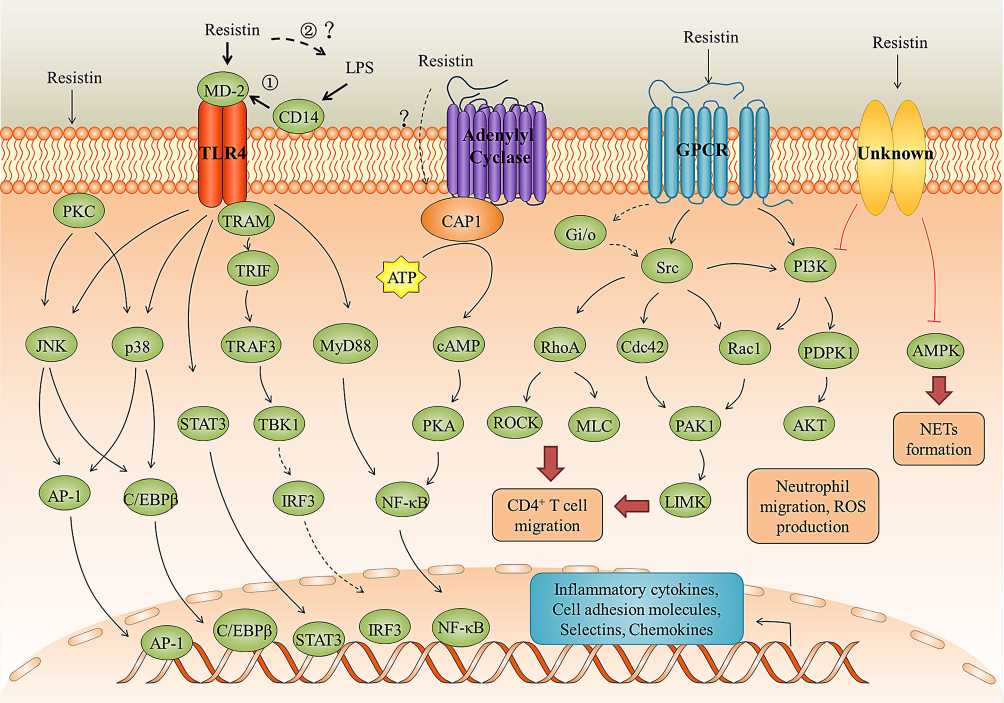What is RETN Protein
What is RETN Protein?
Resistin, a protein encoded by the RETN gene, has emerged as a pivotal player in the intricate world of molecular biology. Initially identified in adipose tissue, resistin transcends its adipocentric origins, finding expression in various tissues, including the liver, spleen, and bone marrow. Its diverse expression points towards a multifaceted role beyond its initial association with metabolic regulation.

Figure 1. Trimeric structure of human resistin. (Li, Y., et al. 2021)
The Function of RETN Protein
Resistin's primary function revolves around metabolic regulation, notably its impact on insulin sensitivity and glucose metabolism. Studies have underscored resistin's role in insulin resistance, a condition intricately linked to disrupted glucose homeostasis. The protein's modulatory influence on insulin sensitivity positions it as a potential target for therapeutic interventions in metabolic disorders, particularly type 2 diabetes.
Furthermore, resistin's involvement in inflammatory processes expands its functional repertoire. Its upregulation during inflammation, notably in adipose tissue, suggests a connection between resistin and immune response modulation. The protein's pro-inflammatory properties indicate its potential contribution to inflammatory disorders, such as rheumatoid arthritis, adding another layer to its complex functionality.
RETN-Related Diseases
Elevated resistin levels have been consistently associated with various diseases, offering a glimpse into its diagnostic and prognostic potential. In the realm of metabolic disorders, resistin emerges as a potential biomarker for insulin resistance and type 2 diabetes. Its correlation with cardiovascular diseases, including atherosclerosis, underscores its relevance in conditions extending beyond the metabolic spectrum.
Rheumatoid arthritis, an autoimmune inflammatory disorder, presents another facet of resistin's impact. The protein's elevated levels in autoimmune conditions point towards its involvement in the dysregulation of immune responses, opening avenues for therapeutic exploration in autoimmune disorders.
RETN Related Signaling Pathways
Unraveling the signal pathways associated with resistin is crucial for understanding its intricate roles. Resistin's interaction with receptors triggers intracellular events, notably the activation of mitogen-activated protein kinase (MAPK) and nuclear factor-kappa B (NF-κB) signaling cascades. These pathways, pivotal in regulating inflammation and immune responses, provide mechanistic insights into resistin's involvement in various physiological and pathological processes.
The modulation of adiponectin, another adipokine with anti-inflammatory properties, further exemplifies resistin's impact on signaling pathways. The counteraction of adiponectin's beneficial effects by resistin contributes to the disruption of metabolic homeostasis, reinforcing its role in the intricate web of molecular interactions.

Figure 2. Resistin signaling pathways in inflammation and immune regulation. (Li, Y., et al. 2021)
Applications of RETN in Biomedical Research
The diverse functionalities of resistin open avenues for its applications in biomedical research, ranging from diagnostics to therapeutic interventions. Monitoring resistin levels emerges as a potential biomarker strategy for conditions linked to metabolic dysfunction. Its utility in risk assessment, diagnosis, and progression monitoring, especially in type 2 diabetes, offers a glimpse into the precision medicine era.
Beyond diagnostics, resistin becomes a target for therapeutic interventions. Researchers are exploring small molecules and biologics that selectively target resistin, presenting a novel approach for managing insulin resistance and associated inflammatory disorders. The potential to neutralize resistin or modulate its signaling pathways holds promise in cardiovascular diseases, where inflammation plays a pivotal role.
In autoimmune conditions, resistin's role in promoting inflammation opens avenues for targeted therapies. Understanding its contribution to the pathogenesis of autoimmune disorders, particularly rheumatoid arthritis, may pave the way for novel treatment strategies that modulate the inflammatory response.
Resistin's journey from adipose tissue to diverse tissues unfolds a narrative of complexity, offering a rich landscape for further exploration and innovation in the ever-evolving field of molecular biology.
Recommended Products for RETN Protein
| Cat.# | Species | Product name | Source (Host) | Tag |
|---|---|---|---|---|
| RETN-197H | Human | Recombinant Human RETN protein, Fc-tagged | HEK293 | Fc |
| RETN-475H | Human | Active Recombinant Human RETN, FLAG-tagged | HEK293 | Flag |
| RETN-761H | Human | Recombinant Human RETN | Mammalian Cell | His |
| RETN-18H | Human | Recombinant Human RETN protein, MYC/DDK-tagged | HEK293 | Myc/DDK |
| Retn-476M | Mouse | Recombinant Mouse Retn, FLAG-tagged | HEK293 | Flag |
| Retn-5467M | Mouse | Recombinant Mouse Retn Protein, Myc/DDK-tagged | HEK293T | Myc/DDK |
| Retn-198R | Rat | Recombinant Rat Resistin, FLAG-tagged | HEK293 | Flag |
| Retn-69R | Rat | Recombinant Rat Resistin, His-tagged | E.coli | His |
| RETN-3423B | Bovine | Recombinant Bovine RETN protein, His-SUMO-tagged | E.coli | His-SUMO |
| RETN-7820C | Cattle | Recombinant Cattle RETN protein, His & GST-tagged | E.coli | His/GST |
Reference
- Li, Y., et al. Resistin, a Novel Host Defense Peptide of Innate Immunity. Front Immunol. 2021, 12: 699807.

